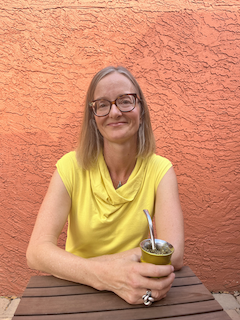In this series, we're sitting down with the Swette Center-affiliated faculty to catch up on food systems, innovation, and what makes a good meal. See the rest of the series on our Food Systems Profiles page.
Read on for an interview with Julia Sarreal, Associate Professor in the School of Humanities, Arts and Cultural Studies.

1) How did you get interested in food systems issues?
I was a Peace Corps volunteer in Paraguay and there I encountered yerba mate, which they drink as tereré with cold water, and mate with hot water. It was really a shock for me to encounter a food item that was ubiquitous. Everybody drank it in Paraguay, and every day. I had never heard of it prior so that was really fascinating to me, for something to be ubiquitous in a country and everybody knows it, everybody uses it all the time, and then to be totally unaware of it in the United States. At the time I was a Peace Corps volunteer, I was in a rural area where people were campesinos, where farmers were mostly subsistence farmers. I really loved going and learning about where food came from. One of the highlights was seeing a friend’s peanut plants. I hadn't ever thought of where the peanut came from, but in my friend's field, he pulled up the roots of this plant and there were so many little peanut shells to see. They were part of the roots! They don’t grow on a tree like other nuts. I later learned that that’s why they are also called groundnuts. I also saw many other processes, not only how food is cultivated, but also how it is dried, cleaned, and stored. I don't have a specialty in agronomy or agriculture, but seeing how things are grown, and then also how they're processed in factories, has always fascinated me but less as an academic subject, more as a personal interest.
2) Share a glimpse of your current research and how it applies to food systems transformation.
I'm trained as a historian. Specifically, I was trained as a colonial Latin American historian. My original research was more focused on ethnohistory, specifically the Guaraní indigenous people of Paraguay and social and economic topics. I recently published a book on yerba mate, and it focuses on both changes in consumption and political economy. It explores how the meaning of consuming yerba mate has changed over time. What does that tell us about people, their values and their beliefs? And I also work on the production of yerba mate, but mostly with regard to political economy rather than agriculture on the ground. My book focuses on yerba mate in South America. More recently, I’ve been exploring its global expansion and what are the continuities and changes in yerba mate as it moves beyond South America. I'm also moving into marketing. I'm really fascinated by how products are marketed, with the recognition that consumers don’t always adopt those visions that marketers portray. And like I suggested earlier, I'd like to do more with agriculture and the actual production side on the ground.
3) What's an innovation in the food systems world that you're excited about?
I’m so excited about how food is a topic that has increasing visibility. More people are looking at food as a research topic, not only the agricultural aspects but understanding the meaning of food. As an example of this increased interest in food, yerba mate is both grown and consumed mostly in South America, and within three years, three top academic presses in the United States (California, North Carolina, and Princeton) are publishing books about yerba mate. That just goes to show the growing interest in learning more about the food and drinks that we consume and what that tells us about our values, our lifestyles, and even our history. I really like looking at material goods to explore what they can teach us.
4) What's your favorite weeknight meal?
I don't have a particular food that I love the most. I love variety, but as a mother I have to say, I have a good recipe for macaroni and cheese. That is one of my favorites, because my kids actually eat it, and they always go back and get seconds! When I try new recipes, I never know if they're going to eat the food, but I always know that they'll eat my mac and cheese that I make from scratch. I love that, but I love eating anything with vegetables, and because today is one of the few rainy, cold days in Phoenix, I think ramen would be a great pick.